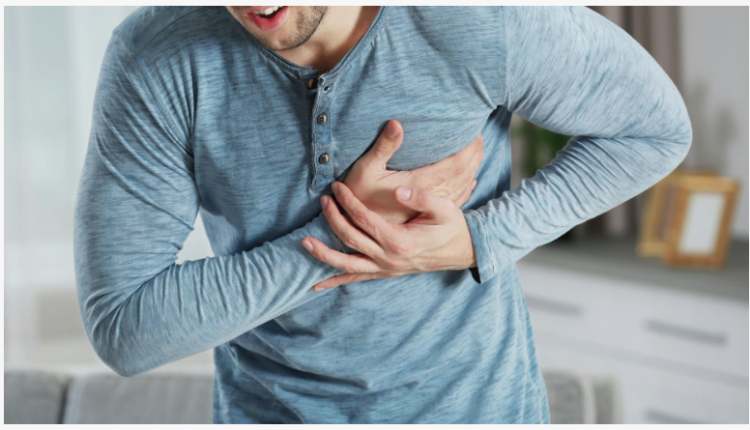What young men need to know about myocarditis
What young men need to know about myocarditis. Myocarditis often goes unnoticed at first, but can have serious health consequences. This is what you need to pay attention to.
You know the old adage from your doctor or your parents: “Don’t let your cold drag on, don’t do too much sport after a flu infection. Otherwise you’ll get myocarditis.” But which ambitious athlete actually follows this advice? Read here why young, extremely fit men in particular should take this warning seriously.
What is myocarditis?
The muscle layer between the inner and outer membranes of the heart is called the heart muscle. The electrical signals that cause the heart muscle to contract and pump blood from the heart into the body run through this muscle. Myocarditis, as the technical term goes, is when the heart muscle cells, coronary arteries or tissue surrounding the heart are inflamed. This limits the activity of the heart muscle, but you often hardly notice it. Unfortunately. Because when you don’t have any symptoms, you think you’re more efficient than you actually are – with the result that you don’t take it easy and acute myocarditis threatens to turn into chronic myocarditis. How to Find the Best Time for Muscle Building Training
What causes myocarditis?
In about 50 percent of cases, myocarditis is preceded by a viral infection of the respiratory tract, such as a severe cold, pneumonia or Covid-19 infection. But bacterial, parasitic and fungal infections can also spread to the heart.
According to American and Israeli studies , corona vaccines can also trigger myocarditis in extremely rare cases (1.3 cases per 100,000 second vaccinations), reports the German Heart Center at the Charité , with young men being comparatively often affected. However, the risk of becoming ill as a result of a vaccination was significantly lower than after a Covid-19 infection.
More rarely, myocarditis is also the result of autoimmune diseases such as lupus or rheumatism. High alcohol consumption and some medications such as antirheumatics and antidepressants can also trigger heart problems.
What symptoms occur with myocarditis?
Myocarditis usually causes hardly any symptoms, or they are very diffuse and can indicate a variety of diseases. Typical symptoms are:
- exhaustion
- loss of appetite
- Headache
- shortness of breath
- pain behind the breastbone
- heart palpitations and racing heartbeat
- Fever
Can you detect myocarditis from blood pressure and pulse?
No, they alone are not meaningful enough, even if it is a good idea for athletes to regularly measure their blood pressure (e.g. with a simple device from Omron ) and pulse (e.g. pulse monitor from Pulox ). In general, however, a low systolic value (that is the first, higher value) of less than 100 mm Hg can be an indication (ideally it is normally around 120 mm Hg). Every man should know this about his blood pressure. However, if this symptom is accompanied by an increased heart rate of over 100 beats per minute at rest, myocarditis can be considered. This tough 4-in-1 exercise replaces any full-body workout
How do I know that it is actually myocarditis?
This is not so easy and that is why myocarditis is often overlooked. Typical symptoms such as tiredness and shortness of breath are usually attributed to an infection, especially since heart palpitations or pain behind the breastbone often do not even occur. Elevated inflammatory parameters, the so-called CRP value, and the creatine kinase and leukocyte values in the blood count can be indications of myocarditis, as can an abnormal electrocardiogram (ECG), which helps detect cardiac arrhythmias and which you can have done at your GP’s office.
However, the result of a heart ultrasound (echocardiography) performed by a cardiologist is more reliable. This can examine the heart’s pumping capacity, which is limited in the case of myocarditis. An MRI and a tissue sample of the heart muscle provide a confirmed diagnosis. Important: Ultimately, only a doctor can diagnose myocarditis with certainty, not you yourself. You can find a cardiologist near you here .
Why are young athletes often affected by severe illnesses?
In general, anyone can get myocarditis, and it usually heals again – if you take it easy during the recovery period and completely avoid sport and other physical exertion. Acute inflammation weakens the heart muscle so much that you very quickly reach your limits.
But young, athletic people in particular often ignore the risk and force themselves to perform at their best too quickly. The diagnosis of “sudden cardiac death” in young people under 40 is therefore often preceded by neglected myocarditis. In autopsies of young people who have died without an obvious cause of death, myocarditis turns out to be the probable cause in 10 percent of cases.
What are the consequences of exercising despite myocarditis?
If you exercise despite having myocarditis, your heart will be overloaded. This can lead to cardiac arrhythmias, because the heart can only pump a fraction of its normal capacity when it is inflamed. If it is still strained, permanent damage such as scarring can occur, which can lead to chronic heart failure and permanently reduce your performance. In the worst case, you will need a heart transplant or suffer sudden cardiac death.
But don’t panic: In 80 percent of all cases, myocarditis heals completely, and only in 15 percent does chronic heart disease develop. And you yourself can help prevent it from getting that far.
How can I prevent myocarditis?
- Don’t ignore the signals from your body. Even increased fatigue and reduced performance can be serious signs. So if you don’t feel completely fit after a bad cold, a Covid-19 infection or a severe gastrointestinal infection , then take it easy or get a check-up at a doctor’s office. Inflammation of the heart muscle usually heals without any problems – if you give it time.
- After a serious infection, athletes should be examined by a cardiologist to determine whether the heart has been damaged by the infection.
- If you plan to train more intensively in the future, try out extreme biohacks or get into competitive sports, whether alone or in a club, you should have your heart examined by a cardiologist beforehand. “It is known that competitive sports, especially extreme sports, can lead to sudden cardiac death if heart disease remains undetected,” warns the German Heart Foundation .
- Question your alcohol consumption. Numerous studies indicate that excessive alcohol consumption leads to inflammation in the body, which can also affect the heart muscle.
How long do I have to rest after myocarditis?
If you are diagnosed with myocarditis, you will have to take three to six months of physical rest, and only after a final examination by a cardiologist and his or her approval can you slowly start training again. By the way: if you have myocarditis, taking it easy doesn’t just mean physical rest, but also abstaining from alcohol and cigarettes.
Of course, you don’t have to stay in bed every time you have a cold. Light endurance exercise is usually good for you, it boosts your immune system and relieves headaches. But take it easy if you don’t feel fit and pay attention to your body, check your pulse and blood pressure with your fitness tracker , for example , and your body temperature with a thermometer . If you have a fever and swollen lymph nodes, you should stop any sporting activities.
Conclusion: Myocarditis should not be underestimated – especially for young, fit athletes
If it is neglected, it can have serious consequences, including permanent heart damage or even sudden cardiac death. After an infection, the key is to slow down, take your body seriously and only start again when you feel really fit.


Comments are closed, but trackbacks and pingbacks are open.